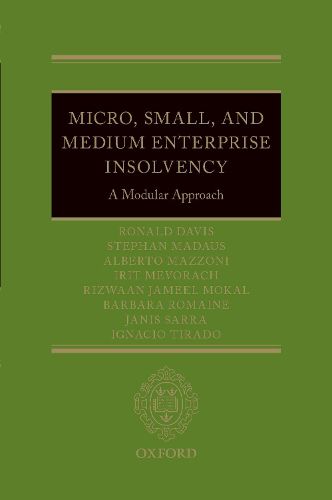Readings Newsletter
Become a Readings Member to make your shopping experience even easier.
Sign in or sign up for free!
You’re not far away from qualifying for FREE standard shipping within Australia
You’ve qualified for FREE standard shipping within Australia
The cart is loading…






This new book systematically examines the current process for distressed Micro, Small and Medium Enterprises (MSMEs), and proposes a different, more appropriate, ‘modular’ approach to the treatment of such entities when faced with insolvency proceedings. MSMEs play a vital role in virtually all global economies. They are a primary means by which entrepreneurs bring new business propositions to the market, and deliver a range of products and services to local economies. MSMEs tend to be more reliant on favourable legal and regulatory climates to survive and thrive than larger businesses, and insolvency regimes are often more tailored to these larger businesses, assuming an extensive insolvency estate of significant worth, and the presence of creditors and other concerned stakeholders to participate in and oversee the process. These assumptions and features are generally incongruous with the reality of MSMEs, for whom assets are of less value and whose stakeholders are generally more disinterested. The modular approach proposed in this book addresses the imbalances, inconsistencies, and lack of supervision which is often apparent in treatment of insolvent MSMEs. It provides an overview of existing approaches to MSME insolvency, the place of MSMEs in the global economy, and the particular needs of MSMEs in financial distress. It then sets out the procedural framework, policy objectives, and key components of the modular approach, detailing how a choice of modules enables national policy-makers a more flexible process for resolution. It then outlines the roles, positions, and obligations of key stakeholder groups, and explains the managerial, administrative, and judicial functions of this approach. Finally, it explains how elements of the broader legal system should be aligned with, and supportive of, the optimal functioning of the modular approach.
$9.00 standard shipping within Australia
FREE standard shipping within Australia for orders over $100.00
Express & International shipping calculated at checkout
This new book systematically examines the current process for distressed Micro, Small and Medium Enterprises (MSMEs), and proposes a different, more appropriate, ‘modular’ approach to the treatment of such entities when faced with insolvency proceedings. MSMEs play a vital role in virtually all global economies. They are a primary means by which entrepreneurs bring new business propositions to the market, and deliver a range of products and services to local economies. MSMEs tend to be more reliant on favourable legal and regulatory climates to survive and thrive than larger businesses, and insolvency regimes are often more tailored to these larger businesses, assuming an extensive insolvency estate of significant worth, and the presence of creditors and other concerned stakeholders to participate in and oversee the process. These assumptions and features are generally incongruous with the reality of MSMEs, for whom assets are of less value and whose stakeholders are generally more disinterested. The modular approach proposed in this book addresses the imbalances, inconsistencies, and lack of supervision which is often apparent in treatment of insolvent MSMEs. It provides an overview of existing approaches to MSME insolvency, the place of MSMEs in the global economy, and the particular needs of MSMEs in financial distress. It then sets out the procedural framework, policy objectives, and key components of the modular approach, detailing how a choice of modules enables national policy-makers a more flexible process for resolution. It then outlines the roles, positions, and obligations of key stakeholder groups, and explains the managerial, administrative, and judicial functions of this approach. Finally, it explains how elements of the broader legal system should be aligned with, and supportive of, the optimal functioning of the modular approach.